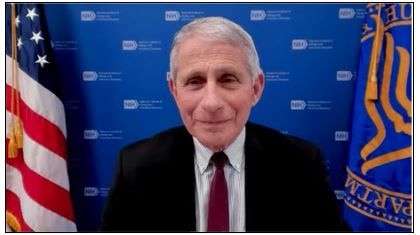- Clinical Technology
- Adult Immunization
- Hepatology
- Pediatric Immunization
- Screening
- Psychiatry
- Allergy
- Women's Health
- Cardiology
- Pediatrics
- Dermatology
- Endocrinology
- Pain Management
- Gastroenterology
- Infectious Disease
- Obesity Medicine
- Rheumatology
- Nephrology
- Neurology
- Pulmonology
Fauci: Widespread COVID-19 Vaccination, Precautions Key to Ending Pandemic
The NIAID head said the timing of the end of the pandemic is really up to the public.
Anthony Fauci, MD, director of the National Institute of Allergy and Infectious Diseases (NIAID), says that the key to combatting the COVID-19 pandemic is widespread vaccination and public health precautions.

Fauci was taking part in a question-and-answer session during the opening plenary of the American College of Physicians (ACP) Internal Medicine Meeting 2021 along with Gregory Kane, MD, treasurer of ACP; and Darilyn Moyer, MD, executive vice president and CEO of ACP.
He said that the current weekly average infection rate of 16 000 infections a day is too high for the country to start pulling back on public health measures especially with the current prevalence of the B117 variant which has been shown to spread much more easily, even among younger patients.
According to Fauci, the infection rate could fall over the next few months as long as the country continues the push toward full vaccination and observes public health measures.
“It's really going to depend on us, when we really want to get out of this and get back to normal,” Fauci said. “If we really want to do that, we'll wind up going getting vaccinated.”
When asked whether COVID-19 could be eradicated globally, Fauci seemed more confident that it will be eradicated in some countries and controlled in others, but the process will take years and require vaccinating a large portion of the world’s population.
“We're going to be continually threatened by variants that will come from other countries, which tells us the obvious solution to that is to make sure that we get the entire world vaccinated against (COVID-19),” Fauci said. “Until we do that, I don't think we're going to eliminate this infection. I think it'll be there at a low level; we'll be protected. We may need to get boosted every once in a while, to keep the level of protection up. But we have to look at it as a global problem, otherwise, we're never going to truly eliminate it.”
Fauci said that early in the pandemic the US response was hamstrung by the years-long dismantling of the local health infrastructure, failure to mobilize the private sector early for diagnostics, and the rapid evolution of the situation with little transparency from China. The transmission method of the virus also caught the world by surprise.
“We've never had any pathogen of any note of seriousness in which … 50% and 60% of the transmissions occur from a person who never will get symptomatic, or who was in the pre-symptomatic stage,” he said. “That broke all the paradigms of infectious disease because, prior to that, transmissions were always a little bit asymptomatic but dominated by the symptomatic person.”
As for the country’s success in responding to the pandemic, Fauci highlighted the Trump administration’s Operation Warp Speed which invested billions in vaccine development and pre-purchase as well as the Biden administration’s rollout of the vaccines.
